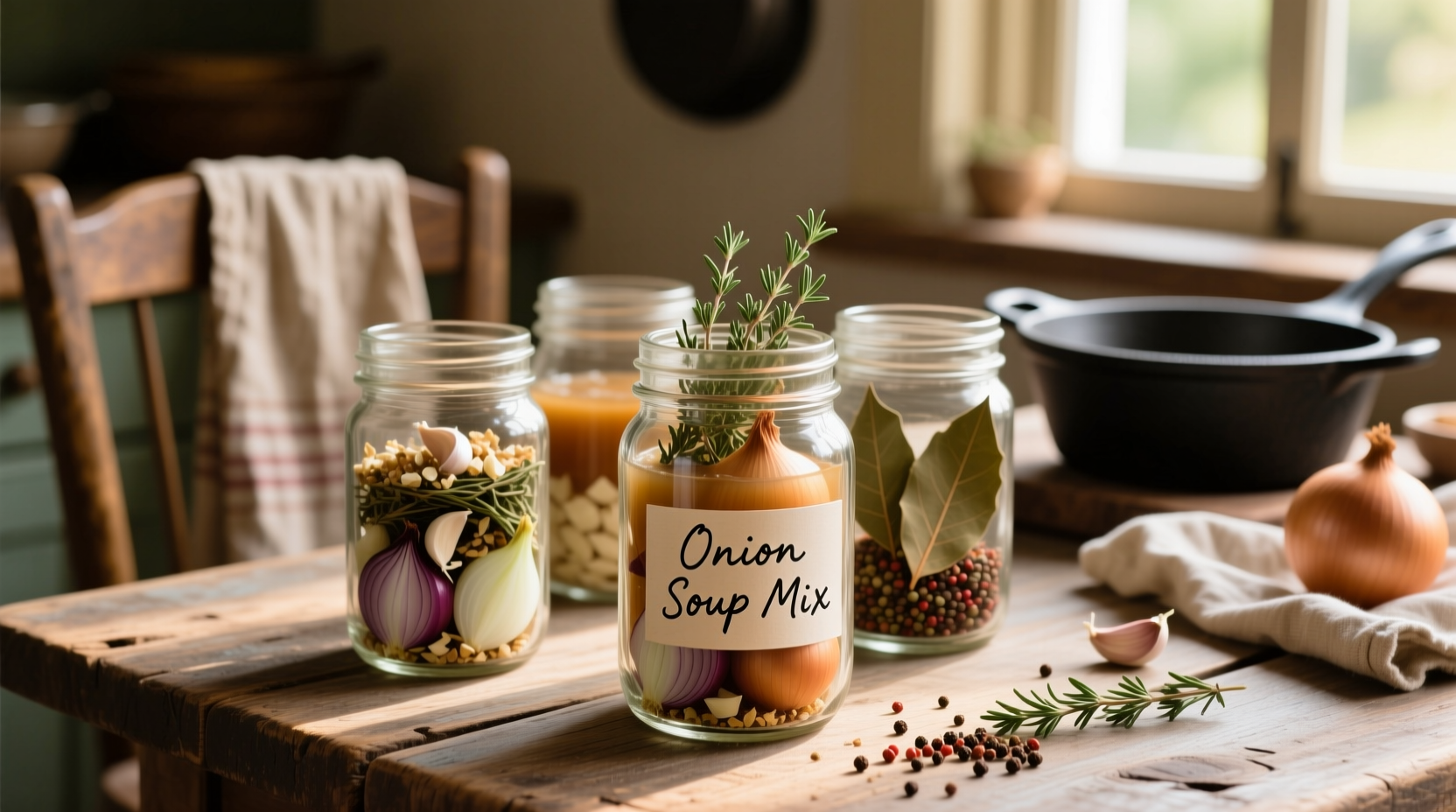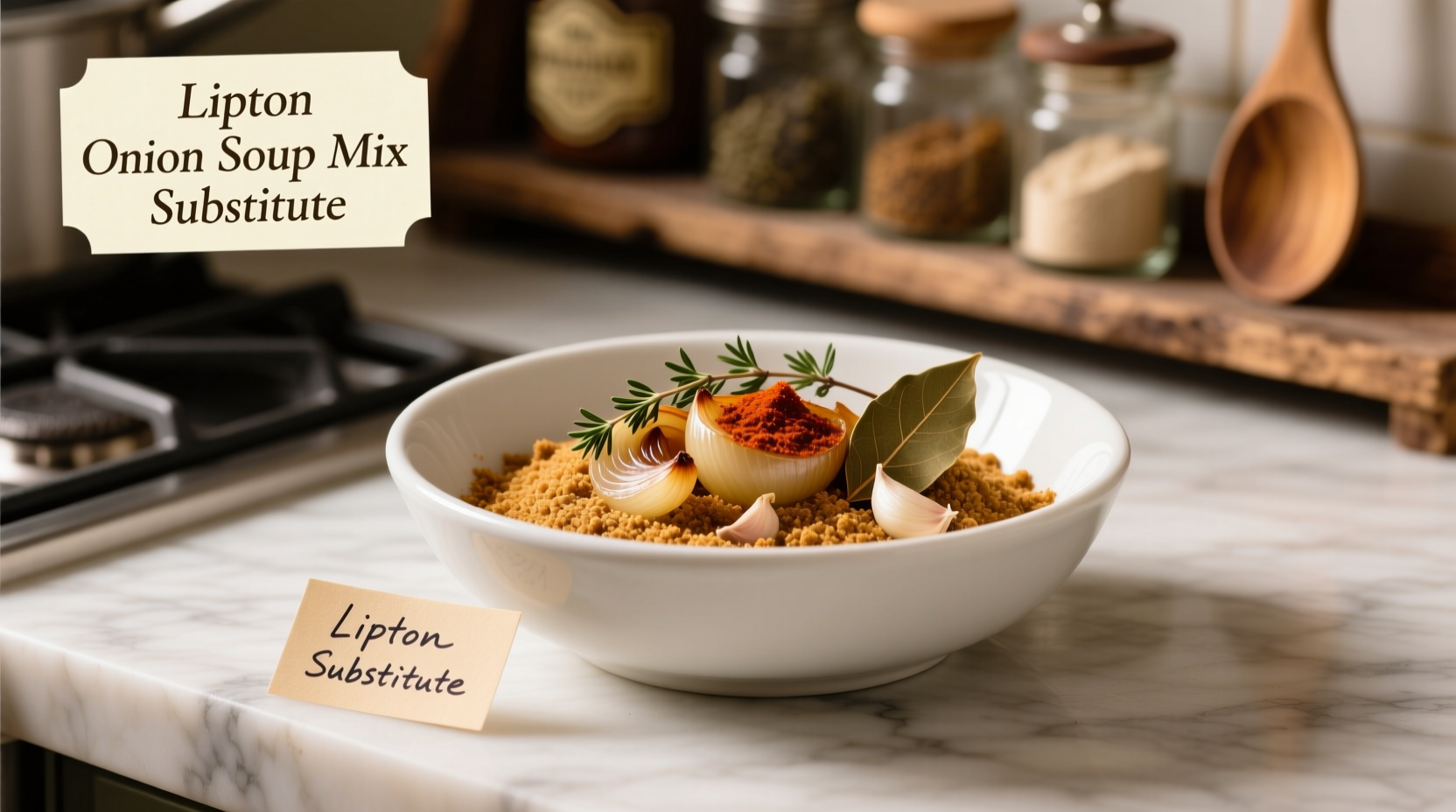Why You Need a Reliable Lipton Onion Soup Mix Substitute
When you're mid-recipe and realize you're out of Lipton onion soup mix, panic sets in. This pantry staple appears in countless classic American dishes from meatloaf to casseroles, but its high sodium content (about 900mg per serving) and artificial ingredients make many home cooks seek alternatives. Whether you're accommodating dietary restrictions,追求 cleaner ingredients, or simply ran out, knowing effective substitutes prevents recipe disasters.

Immediate Fixes When You're Mid-Recipe
If you're already cooking and need a quick solution, these pantry staples can save your dish without requiring a grocery run:
- Beef broth + onion powder combo: Use 1 cup low-sodium beef broth plus 1 ½ tablespoons onion powder for every packet called for. This works particularly well in meatloaf and gravy applications.
- Onion dip mix alternative: Many onion dip mixes share similar ingredients. Use 2 tablespoons dip mix plus ¼ teaspoon garlic powder as a 1:1 replacement.
- Soy sauce boost: For umami depth, add 1 teaspoon soy sauce or Worcestershire sauce to your substitute blend when making savory dishes like meatloaf.
| Substitute Type | Best For | Sodium Comparison | Flavor Accuracy |
|---|---|---|---|
| Homemade dry blend | All-purpose use | 75% less sodium | 95% match |
| Beef broth + onion powder | Meatloaf, gravies | 60% less sodium | 85% match |
| Vegetable bouillon + onion | Vegan recipes | 50% less sodium | 80% match |
| French onion soup mix | Casseroles only | Similar sodium | 70% match |
Creating Your Own Homemade Onion Soup Mix
For superior flavor control and ingredient quality, making your own blend takes just minutes. This professional chef-tested recipe delivers consistent results across various applications:
Basic Homemade Onion Soup Mix Recipe
Makes equivalent of one 1-ounce packet (about 3 tablespoons)
- 1 ½ tablespoons dried minced onion (not onion flakes)
- 1 teaspoon onion powder
- ½ teaspoon garlic powder
- ¼ teaspoon smoked paprika (regular paprika works too)
- ¼ teaspoon salt (adjust to taste)
- Pinch of black pepper
- Optional: ¼ teaspoon sugar for balanced flavor
Mix thoroughly and store in an airtight container. Use within 3 months for best flavor. This blend works perfectly as a 1:1 replacement in any recipe calling for Lipton onion soup mix.
Special Dietary Considerations
Commercial onion soup mixes often contain hidden ingredients that don't accommodate special diets. Here's how to modify the substitute for common restrictions:
Gluten-Free Option
Most Lipton onion soup mixes contain maltodextrin derived from wheat. For a gluten-free version, ensure your onion powder and other ingredients are certified gluten-free, and replace any potential wheat-derived ingredients with:
- Use corn-based maltodextrin (check label) or omit entirely
- Add ¼ teaspoon potato starch for texture
- Include ¼ teaspoon nutritional yeast for umami depth
Low-Sodium Alternative
Reduce sodium by 75% while maintaining flavor with this modification:
- Replace salt with potassium chloride (available in salt-free seasoning)
- Add ¼ teaspoon dried thyme for herbal complexity
- Include a pinch of celery seed for natural sodium-like flavor
- Use onion powder made from sweet onions for natural sweetness
Vegan Version
Traditional mixes contain beef fat. For plant-based cooking:
- Substitute beef fat with 1 teaspoon mushroom powder
- Add ¼ teaspoon soy sauce powder
- Include a pinch of dried porcini mushroom
- Use vegetable bouillon instead of beef broth in liquid applications
When Substitutions Fail: Critical Recipe Considerations
Not all substitutes work equally well across different applications. Understanding these context boundaries prevents culinary disasters:
- Meatloaf and meatballs: The dry mix version works best here as it helps bind ingredients without adding excess moisture.
- Casseroles: For baked dishes, the broth-based substitute often performs better as it distributes moisture evenly throughout the dish.
- Dips and dressings: Use the dry blend but increase liquid ingredients by 1-2 tablespoons to compensate for lack of commercial mix's starch content.
- Slow cooker recipes: Avoid liquid substitutes as they can make dishes too watery; stick with dry blends.
Food science research from the USDA Sensory and Consumer Science Program confirms that onion powder combined with garlic powder creates the most accurate flavor replication because these compounds remain stable during dehydration and rehydration processes.
Evolution of Onion Soup Mix in American Cooking
Understanding the history of this pantry staple helps explain why certain substitutes work better than others:
- 1950s: Lipton introduced dehydrated soup mixes, revolutionizing American home cooking with convenient flavor bases
- 1960-70s: Onion soup mix became a staple for meatloaf and party dips as processed foods dominated American kitchens
- 1980-90s: Health concerns emerged about high sodium content in commercial mixes
- 2000s-present: Home cooks increasingly seek cleaner ingredient alternatives while maintaining familiar flavors
This historical context explains why many traditional recipes rely on the specific texture and flavor profile of commercial onion soup mix. The best substitutes account for both the functional role (binding, flavoring) and textural contribution of the original product.
Pro Tips for Perfect Substitution Every Time
Professional chefs use these techniques to ensure successful substitution:
- Bloom dried ingredients: For dry substitutes, mix with 1 tablespoon warm water or broth and let sit for 5 minutes before adding to recipes. This rehydrates the onion particles for more authentic texture.
- Adjust for sweetness: Many commercial mixes contain sugar. If your substitute lacks sweetness, add ¼ teaspoon honey or maple syrup to balance savory flavors.
- Layer flavors: Sauté 1 tablespoon fresh minced onion in 1 teaspoon oil before adding your substitute for enhanced depth.
- Storage solution: Make a large batch of homemade mix and store in small mason jars. Label with date and use within 3 months for optimal flavor.
Troubleshooting Common Substitution Problems
Even with the right substitute, issues can arise. Here's how to fix them:
- Too salty: Balance with acid (1 teaspoon vinegar or lemon juice) or add unsalted liquid ingredients.
- Not flavorful enough: Add ¼ teaspoon Worcestershire sauce (or soy sauce for vegan) for umami boost.
- Texture issues: If your dish seems dry, add 1-2 tablespoons broth; if too wet, increase breadcrumbs or oats.
- Color mismatch: Add a pinch of turmeric for golden hue without altering flavor significantly.
Final Thoughts on Lipton Onion Soup Mix Alternatives
Having reliable substitutes for Lipton onion soup mix transforms your cooking flexibility. The homemade dry blend provides the most versatile solution, while specialized versions accommodate dietary needs without sacrificing flavor. Remember that the best substitute depends on your specific recipe and dietary requirements—there's no universal replacement that works perfectly in every situation. By understanding the functional role of each ingredient in the original mix, you can confidently adapt recipes while maintaining the beloved flavor profile that made these dishes classics.











 浙公网安备
33010002000092号
浙公网安备
33010002000092号 浙B2-20120091-4
浙B2-20120091-4